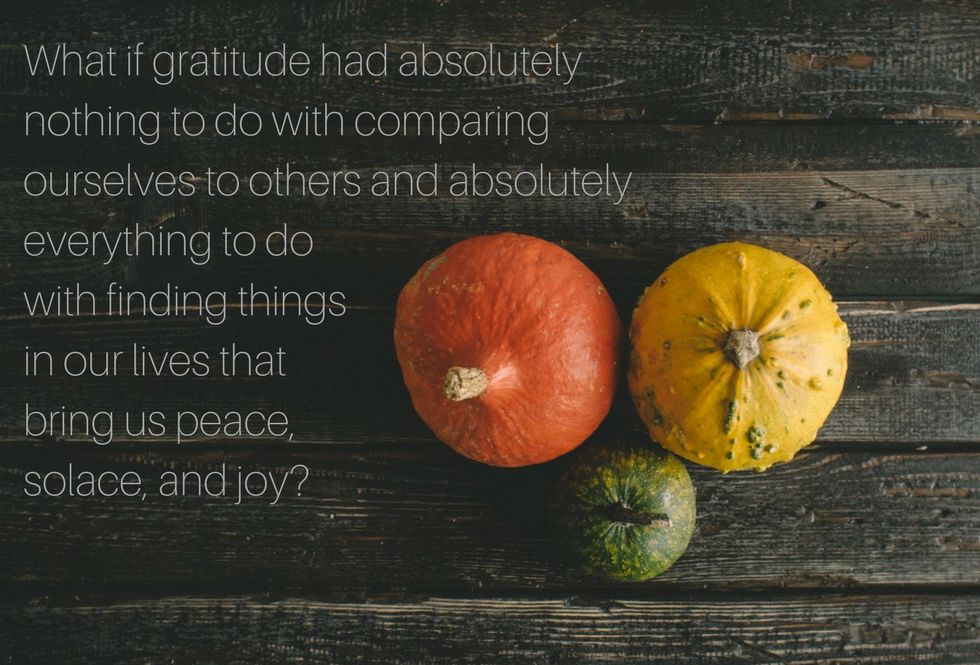What if we are doing this gratitude thing all wrong? Here’s how I hear people doing gratitude: “It’s too bad your basement flooded, but you should just be grateful that your pipes didn’t burst. That’s much worse.” “I’m so sorry that you have cancer, but you should just be grateful that the kind you have is treatable.” “I’m sorry that your mom died, but you should just be grateful that she didn’t suffer.”
Here’s the thing. Some of us might want to be grateful for those things, but gratitude isn’t about comparing ourselves to others in worse situations and being grateful that we aren’t them. Gratitude is truly finding things in life that we are grateful for. My basement recently flooded and I’m not grateful for it at all. It was messy and expensive and a big hassle. Sometimes I don’t want to “just be grateful.”
I have friends who have had cancer and I know that they aren’t grateful that they had it at all. Yes, they are grateful that it was treatable, but they still would have preferred not to have had cancer. Also, when we lose a loved one, I don’t think most of us feel gratitude for that loss or that the loss was tempered in some way. Losing someone is tragic regardless of the details. I would never expect someone who lost their child to be grateful in any way about their loss.
Gratitude as Medicine
So how can we do gratitude better? What if gratitude was like good cold medicine? Cold medicine doesn’t cure a cold, but it certainly makes us feel slightly less miserable when we have that cold. What if even in the midst of suffering, sadness, or aggravation, we found something else to be grateful for? What if gratitude was actually the antidote to some of our suffering versus the comparison to others as an excuse to be grateful?
What if gratitude had absolutely nothing to do with comparing ourselves to others and absolutely everything to do with finding things in our lives that bring us peace, solace, and joy? What if when we lose a loved one, we looked for other things in our life that brings us joy? Not “At least I have other people to love so I’m grateful for that.” But rather, “I’m grieving the loss of my loved one and at the same time I am grateful for my children.” Gratitude would not replace grief, but rather mitigate it. It would not be mutually exclusive, but rather part of a variety of emotions.
The week my basement flooded was a frustrating one. My house was in chaos, it smelled bad, and the bills were adding up with frightening speed. Well-meaning friends said to me, “Be grateful that it was clean water.” Or “You are lucky that your floor wasn’t ruined.” But I didn’t feel very lucky or grateful about my flooded basement. I was aggravated. Instead I searched for other things in life that I was grateful for such as my children, our health, my silly dog, and a favorite book. I used gratitude to sooth my frustrations about my messy basement.
What would it mean for you to use gratitude as a medicine to cure your woes or a vaccine to protect you from aggravation? How would you have to change your mindset in order to do gratitude in a way that really works for you? I’d love to hear what you come up with.
What would it mean for you to use #gratitude as a medicine to cure your woes? #Thanksgiving Click To TweetHappy Thanksgiving, dear reader. I am eternally grateful to each of you for reading my blogs, sending me comments and support, and for sharing a piece of your life with me. I am sending you all loving wishes and good thoughts for a wonderful holiday week.
Love,

Lisa Kaplin Psy. D. PCC


Happpppy Thanksgiving Dr Lisa! Thank you for all your words of wisdom and support. You are my medicine and I am truly grateful! LOVE! Linda Scull RN